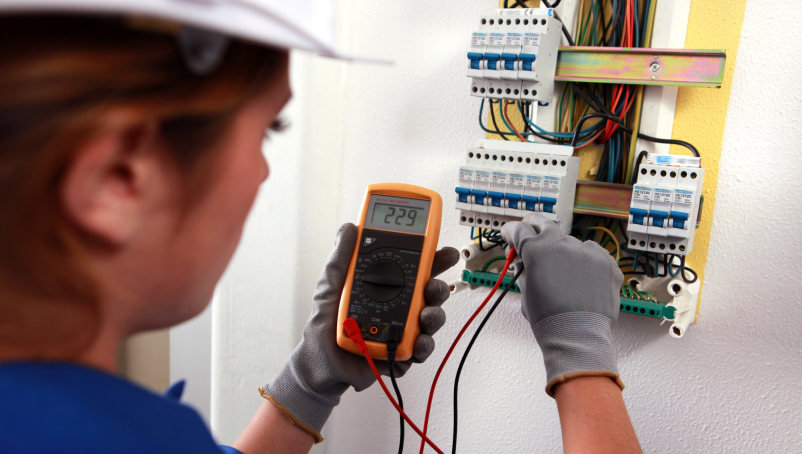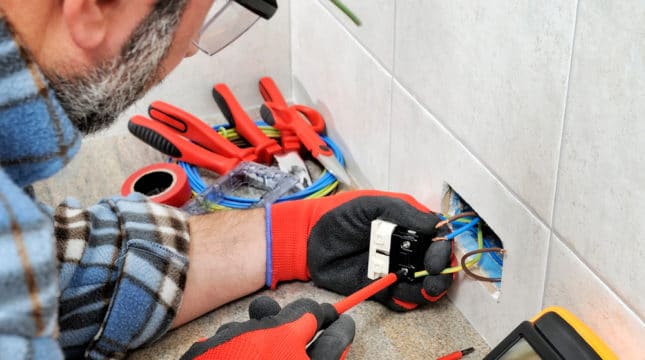Do you need a New Jersey electrical license to do electrical work?
Yes, you need a license to work as an electrician in New Jersey. The state requires all electricians to be licensed to ensure they meet safety standards and comply with local building codes. The New Jersey Division of Consumer Affairs oversees the licensing process for electricians through the Board of Examiners of Electrical Contractors.
There are two different types of New Jersey electrical licenses. They are:
- Journeyman electrician. Licensed journeymen can perform electrical work under the supervision of a licensed contractor. They are allowed to install, repair and maintain electrical systems and equipment.
- Electrical contractor. New Jersey electrical contractor license holders can operate their own electrical business and supervise journeyman electricians. They can perform all types of electrical work, contract with clients, oversee projects and hire employees.
Unlike other states, there is no New Jersey master electrician license.
With the demand for new housing and skilled electricians rising, it’s an excellent time to enter this field. According to the Bureau of Labor Statistics, Garden State electricians are among the nation’s highest-paid.
Insurance requirements for a New Jersey electrical license
Electrician insurance can help you protect the business you’re building. The type of insurance you may need depends on whether you operate a small business with employees or are self-employed as an electrician. The following policies help safeguard your business from unexpected financial losses.
Workers’ Compensation insurance
New Jersey requires most businesses with one or more employees to obtain workers’ compensation insurance. This coverage helps pay for job injuries, illnesses, lost wages and medical expenses.
Learn more about workers’ compensation for contractors.
General Liability insurance
While not required for getting your license, general liability insurance can help cover non-employee slip-and-fall injuries and property damage. It also helps cover advertising injuries — such as slander or libel — and reputational harm.
Learn more about general liability insurance for contractors.
Commercial Property Insurance
Commercial property insurance can help cover your business property, including physical spaces you own or rent, inventory, and equipment.
Business Owner’s Policy
A business owner’s policy, or BOP insurance, provides broad coverage of general liability and commercial property policies combined in a single, cost-efficient bundle. That means it can help cover damage that you or your employees may accidentally cause to another person’s property and help protect your business equipment in the event of a fire or other covered event.
Tool and Equipment insurance
Tools and equipment insurance can help provide repair and replacement coverage for workplace equipment damaged, stolen or lost while on a job.
Commercial Auto Insurance
If you drive a vehicle for work purposes, commercial auto insurance can help pay accident-related expenses such as repairs or towing. If you use your own vehicle, your personal auto insurance may not cover work-related activities.
In the state of New Jersey, auto coverage minimums for bodily injury are $25,000 per person and $50,000 per incident. You also need at least $25,000 for damage to another person’s property.
How to get an electrician license in New Jersey
Getting an electrician license in New Jersey involves steps to ensure you have the necessary experience and knowledge.
If you’re starting without experience, obtaining an electrician license in New Jersey can take four to six years. This includes gaining practical experience, completing educational requirements, applying for the license and prepping for the exam.
Here’s a basic overview of the licensing process.
1. Become an apprentice electrician
Electrician training in New Jersey doesn’t require a special license, but you must enroll in a vocational school or apprenticeship program approved by the U.S. Department of Labor.
While apprenticeship program requirements vary, these are typical requirements:
- You must be at least 18 years old.
- A high school diploma or equivalent (GED) is typically required
- Background check
- Driver’s license
- Undergo interviews and assessments
2. Gain experience and fulfill educational requirements
You can get experience through trade schools, community colleges, and union or non-union apprenticeship programs.
According to New Jersey law, to become a journeyman electrician, you must complete four years of a United States Department of Labor-accredited and approved apprenticeship. However, a “journeyman electrician” differs from a “qualified journeyman electrician.
A qualified journeyman electrician has fulfilled additional requirements and can supervise the work of apprentices. To apply for a journeyman electrician license, you need:
- 8,000 hours of documented experience (4,000 hours completed within five years before applying)
- Fulfill a minimum of 576 hours of classroom training
- Hold a current valid active electrical contracting license issued by the Board
Electrical contractor license requirements include:
- Be over 21 years of age
- Hold a high school diploma or equivalent
- Pass a licensing exam
- Provide proof of at least five years of experience working in electrical construction and installation to the Board.
Experience can include the following:
- Earn a bachelor’s degree in electrical engineering with two years of field experience
- Complete a four-year apprenticeship program plus one year of field experience
- Get a journeyman electrician license with one additional year of field experience
Note: New Jersey does not have any reciprocity agreements with other states.
3. Apply for the licensing exam
Before you can get your electrical contractor license, you must pass an exam. You must get authorization from the Board to sit for the exam.
When submitting the application form, documentation, you must also submit the necessary documentation, including proof of your work experience, educational credentials and apprenticeship completion certificates. The exam application fee is $100 and is non-refundable.
4. Pass the licensing exam
To pass the electrical contractor exam, candidates must score 70% or higher on 150 questions in general electrical knowledge and specific electrical topics. The exam is in three parts — candidates must pass all parts:
- Electrical contractor
- Alarm systems
- Business and law
The exam is administered through PSI and is open book; PSI will provide the most current version of the National Electrical Code (NEC).
You can find more information about the exam in PSI’s Licensure Examination Information Bulletin.
After passing the exam, your results will be sent to the Board, and you will receive your electrician license.
New Jersey license renewal requirements
Licenses expire every three years. Before renewing, licensed electricians must complete 34 hours of continuing education, which includes nine hours of National Electrical Code and one hour of New Jersey laws, rules and regulations. Journeymen must complete 10 hours of continuing education.





